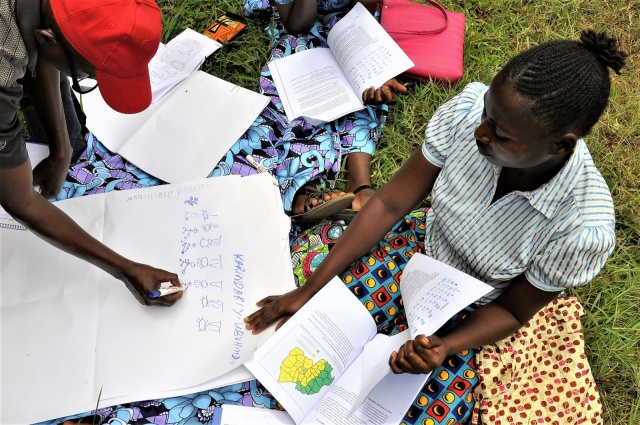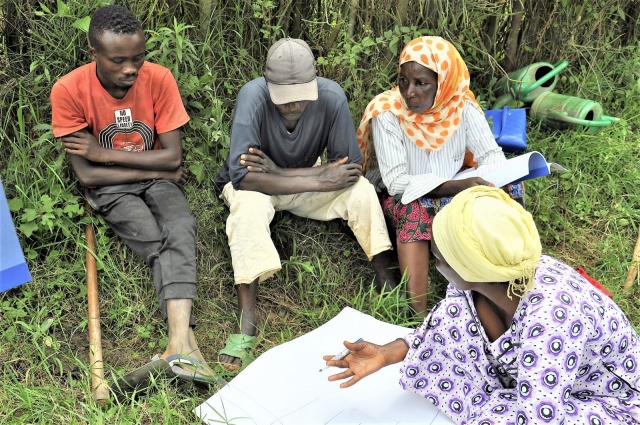Trainings in climate services for agriculture reach all of Rwanda
- From
-
Published on
21.03.19
- Impact Area

The human body can predict. You can look to the sky and know it will rain. Now we’ve learned about climate histories of Kanyinya, and we can mix this with our own knowledge.”
Monique Mukabahizi, Farmer Promoter, Nyarugenge District
For thousands of years, traditional ecological knowledge alone was enough to read the winds, know the temperament of the rains, when to expect hot spells, when to plant and when to harvest. A surge of unpredictable heavy rains, prolonged dry periods and extreme weather events, heralded by a changing climate, have complicated the reliability of traditional knowledge systems alone to shape promising seasons for farmers’ livelihoods. To complement these ancestral ecological ways of knowing, Participatory Integrated Climate Services for Agriculture (PICSA), developed by the University of Reading, facilitates informed decision-making by farmers by providing timely and location-specific climate information pertinent to agricultural livelihoods.
This integrative approach is being applied as part of the Rwanda Climate Services for Agriculture (RCSA) project, combining historical and forecasted climate trends, analysis of options and risks for different livelihood choices, and participatory seasonal planning tools for farmers. The RCSA project is coordinated by the CGIAR Research Program on Climate Change, Agriculture and Food Security (CCAFS) and supported by the US Agency for International Development (USAID).
Making climate information a fluent part of farmers’ vocabulary
In February 2019, Meteo Rwanda, the Rwanda Agriculture Board (RAB), the International Centre for Tropical Agriculture (CIAT) and CCAFS gathered in Nyarugenge, Kicukiro and Gasabo districts of Rwanda’s capital, Kigali, to facilitate week-long PICSA trainings to more than 200 farmers, agronomists, socio-economic development officers, farmer promoters and agricultural extension workers.
Since the RCSA’s launch in 2015, PICSA trainings have been facilitated twice annually, before the start of each planting season. Culminating in Kigali and with the indispensable support of Caritas, Développement Rural du Nord (DERN), CIAT-Rwanda and CCAFS, PICSA trainings have now directly reached more than 150,000 farmers and agricultural extension workers in all 30 districts of Rwanda.

Farmers during the PICSA training in Mageragere Site. Photo: S. Samuel (CCAFS)
The PICSA approach combines resource mapping, seasonal calendars, climate information from traditional and scientific knowledge systems, participatory budgets, short-term and seasonal forecasts to evaluate the opportunities and risks for farmers’ crop, livestock and livelihood options. The application of these participatory methodologies aims to foster informed farmer decision-making and planning that enhances farmers climate resilience and adaptive capacity.
On the ground PICSA impressions
Each of the farmers and agricultural extension workers present during the PICSA trainings stood not only for themselves, but instead also represented groups of around 20 farmers from their respective districts, allowing the participatory approach to spread its impact and reach.
I’ve learned how to determine if the rains will pour or fall gently, how to calculate gains and losses and how to predict before planting. I used to detect these trends by chance.”
Fouraha Rwanyindo, Facilitator, Mageragere Site

Farmers training farmers during the PICSA sessions. Photo: S. Samuel (CCAFS)
PICSA came on time. Forecasts, historical data, prediction: they were things I knew but didn’t understand how to apply. Now I can share this with my neighbors so that others can see and learn.”
Mukamazimpaka Mwamimi, Farmer Promoter, Nyarugenge District
As a new set of agricultural extension workers have now been trained in participatory approaches to harness climate services, the RCSA project continues into its final year, guided by its central vision of ensuring Rwanda’s farmers and livelihoods are resilient, adaptive and productive in the face of climate change.
Read more:
- Project newsletter: Rwanda Climate Services for Agriculture: Transforming Rwanda’s rural farming communities and national economy through improved climate risk management
- News update: News partnerships launched to bolster climate services in Rwanda
- News update: Youth, agriculture and innovation: Building the capacity of young entrepreneurs to manage climate risks
- Blog: Rwandan farmers share how climate information helps them improve food security
- Press release: Rwanda Climate Services for Agriculture project awarded the first ever Climate Smart Agriculture Project of the Year 2018
Main partners of the RCSA project include Meteo Rwanda, Ministry of Agriculture and Animal Resources (MINAGRI), RAB, CIAT, International Livestock Research Institute (ILRI), World Agroforestry Centre (ICRAF), International Research Institute for Climate and Society (IRI) based at Columbia University, University of Reading, Radio Huguka, DERN, N-Frnds and Caritas.
Related news
-

Bridging science, finance, and restoration: Insights from the sustainable beef investment roundtable
Multifunctional Landscapes Science Program17.11.25-
Climate adaptation & mitigation
Rome, 2–4 October 2025 — The Sustainable Beef Investment Roundtable brought together over 50 pa…
Read more -
-

COP30 Week 1: Negotiation Highlights and CGIAR Perspectives
Climate Action Science Program17.11.25-
Adaptation
-
Climate adaptation & mitigation
-
Mitigation
Week 1 of COP30 in Belém, Brazil – set against the backdrop of the Amazon…
Read more -
-

DTA at COP30: Why Digital Transformation Belongs at the Heart of Climate Action
Climate Action Science Program13.11.25-
Adaptation
-
Climate adaptation & mitigation
-
Mitigation
As the world gathers in Brazil for COP30, the conversations are once again focused on…
Read more -
